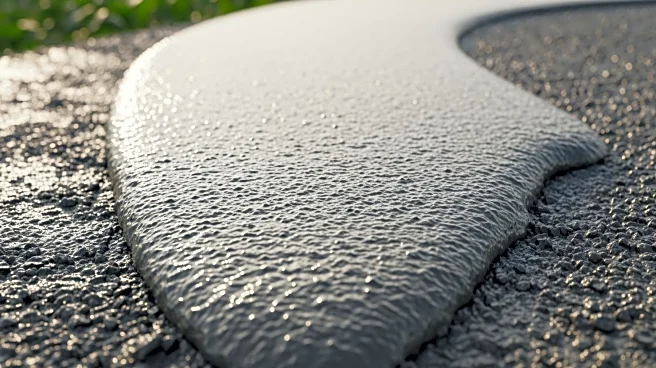What's Happening?
The global self-leveling concrete (SLC) market is experiencing significant growth, with its value projected to increase from $7.7 billion in 2023 to $10.4 billion by 2030, at a compound annual growth rate (CAGR) of 4.3%. This growth is driven by the rising
demand for quick-install flooring solutions, rapid urban development, and the increasing use of high-performance materials in various construction sectors. Self-leveling concrete is recognized for its superior flowability, fast setting time, and ability to create smooth, durable surfaces with minimal labor, making it a vital component of modern high-efficiency flooring systems. Recent developments in the U.S. include the introduction of fast-curing SLC formulations for large-scale commercial projects and the expansion of polymer-enhanced SLC products for industrial refurbishment. These innovations aim to improve flowability, reduce shrinkage, and enhance performance under heavy-load conditions.
Why It's Important?
The advancements in self-leveling concrete technology are crucial for the construction industry, particularly in the U.S., where there is a growing demand for efficient and durable flooring solutions. The ability to quickly install and renovate flooring with minimal downtime is essential for commercial and industrial sectors, which require high-performance floors capable of withstanding heavy loads. The shift towards sustainable construction materials is also encouraging the use of eco-friendly SLC products, aligning with broader environmental goals. Companies involved in the production and distribution of SLC are likely to benefit from increased market demand, while construction firms can leverage these innovations to enhance project efficiency and reduce labor costs.
What's Next?
The self-leveling concrete market is expected to continue evolving with technological improvements in polymer-modified and hybrid formulations, enhancing flowability, strength, and setting time. The introduction of rapid-setting and high-flow formulations tailored for fast-track commercial construction projects will further support market expansion. Additionally, the integration of smart additives and advanced binders to improve moisture tolerance and surface finish is anticipated to drive further adoption of SLC in various applications, including underfloor heating installations. As the market grows, stakeholders such as construction companies, material suppliers, and technology firms will likely focus on expanding their product offerings and distribution networks to capitalize on emerging opportunities.
Beyond the Headlines
The self-leveling concrete market's growth reflects broader trends in the construction industry, including the emphasis on sustainable building practices and the adoption of advanced materials to improve efficiency and performance. The use of eco-friendly additives and low-VOC products in SLC formulations highlights the industry's commitment to reducing environmental impact. Moreover, the development of fiber-reinforced and polymer-enhanced SLC to improve split resistance and long-term durability addresses the need for resilient infrastructure capable of withstanding the challenges posed by urbanization and climate change.















